-
Recent Posts
Categories
Latest Tweets
Tag Cloud
advertising american express amex blog blogging brand branding budget friendly business cards business success commercial printing commerical printing company brand direct mail effective marketing email email marketing facebook globaltech globaltech east inc google graphic design keywords logo mail marketing online online marketing online reputation pay-per-click ads print printing print marketing print myths print rumors reputation sbs seo small business small business saturday social social media twitter website website content
Tag Archives: twitter
67% Of Americans Use Social Media (With One In Six Active On Twitter)
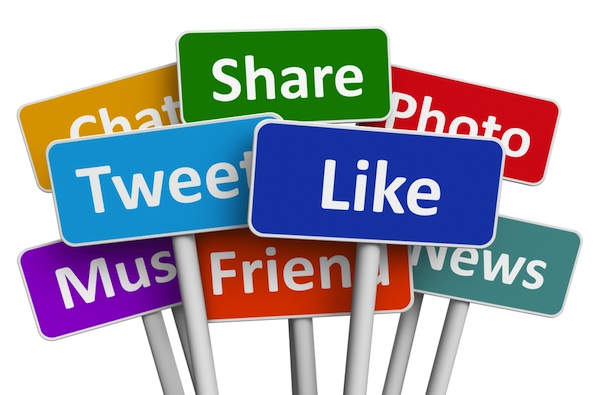 Two thirds of Americans have a profile on one or more social networks, reveals a new study, with about one in six (16 percent) using Twitter.
Two thirds of Americans have a profile on one or more social networks, reveals a new study, with about one in six (16 percent) using Twitter.
Edison Research surveyed more than two thousand U.S. citizens re using digital platforms and found that 67 percent of respondents use social media.
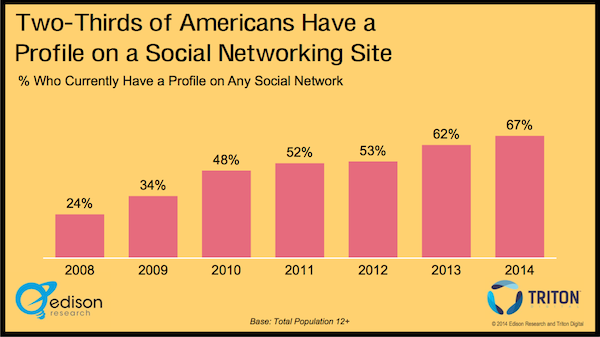 Of these, more than half (58 percent) are active on Facebook – a statistic that is unchanged year-on-year – with 19 percent using LinkedIn (up two percentage points), 19 percent on Instagram (up 7 percentage points), 17 percent on Google+ (up 5 percentage points) and 16 percent on Twitter (up 1 percentage point).
Of these, more than half (58 percent) are active on Facebook – a statistic that is unchanged year-on-year – with 19 percent using LinkedIn (up two percentage points), 19 percent on Instagram (up 7 percentage points), 17 percent on Google+ (up 5 percentage points) and 16 percent on Twitter (up 1 percentage point).
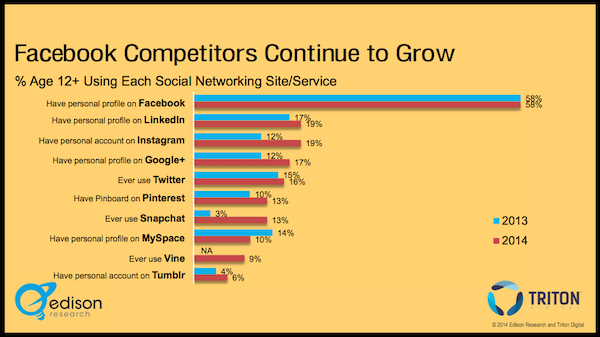
As you might expect, all social networks – with the exception of LinkedIn – are more popular amongst the younger demographic.
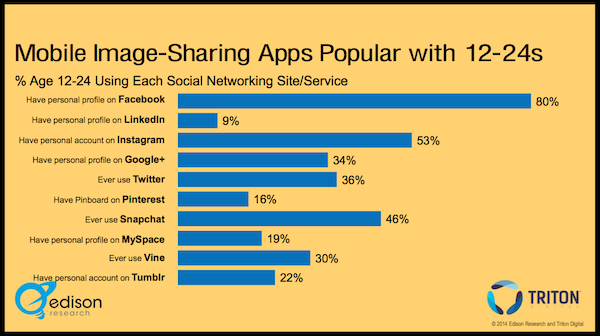
An estimated 75 million Americans check their social networks several times each day.
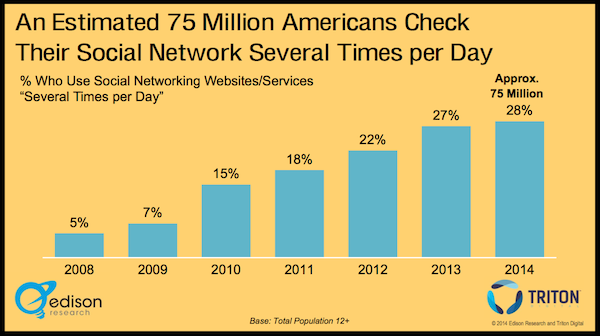
Overall, these numbers are bullish for social media but not particularly strong for Twitter, which increasingly looks like it will have to keep a very close eye on Instagram (and even Snapchat) for attention from users of all ages, but especially the next generation of consumers.
Posted in Online Marketing
Tagged facebook, online marketing, social media, social networks, twitter
Email Is 40 Times More Effective Than Facebook and Twitter
What? You’ve opened up that thing called “Outlook Express,” and you’re writing an email?
Surely you know that this form of marketing and communications is as pass? as floppy disks and cell phones the size of Shaquille O’Neal’s shoe.
Or is it? Now comes a McKinsey & Co. survey stating that email is a far more effective way to acquire customers than all that tweeting and posting and “liking” you’re doing on social media–nearly 40 times more than Facebook and Twitter combined.
“If you’re wondering why marketers seem intent on e-mailing you more and more,” McKinsey states, “there’s a simple explanation: it works.”
That explains our inbox.
We learned of the McKinsey survey through a post by Technorati writer Kaleel Sakakeeny, who adds that email’s advantage holds “if your goal is to acquire customers, and not just share the latest family news or travel experience.”
Depending on your perspective, McKinsey’s report may be earthshaking or simply what you’ve been telling everybody for years.
Dawn of the social media age
Since the dawn of the social media age, back when wooly mammoths roamed the plains and fur-clad hunter/gatherers crouched around the campfire tweeting selfies, contrarians have touted the necessity of email.
Ancient seer Jeremiah Owyang argued in 2009 that email was “the first–and largest–social network.” And cave scratchings in the form of a HostPapa infographic indicate that the bloody clash between email and social media was a matter of discussion way back in 2012.
More recently, Hospitality Net in December awarded three of a five-round match to email in an article titled “Email vs. Social Media–Which One Deserves Your Marketing Dollar?
“While there is a lot of hype around social media when it comes to usage, email wins hands down,” author Madigan Pratt asserts in a piece for the hotel industry.
Still, McKinsey’s research chops make its contribution to the debate significant. In its post, authors Nora Aufreiter, Julien Boudet, and Vivian Weng offer three tips for those marketing or communicating through emails. Among them: “Focus on the journey, not the click.”
“Customized landing pages–which send the user directly to the item or offer featured in the e-mail–can increase conversion rates by more than 25 percent,” the authors write. “And don’t forget mobile. Nearly 45 percent of all marketing e-mails today are opened on a mobile device.”
Tough luck for those smartphone users can’t be bothered to sit at a computer, right? They irritate everybody playing Annoying Orange’s Splatter Up during memorial services and symphony performances, anyway. Who needs them?
Well, shrug them off at your own risk, McKinsey says.
“Google says 61 percent of users are unlikely to return to a mobile site they had trouble accessing,” the article states. “And, even worse, 40 percent visit a competitor’s site instead.”
Sounds like its time not only to rethink your social media vs. email practices, but to your mobile strategy and landing pages as well.
Read the rest here.
Posted in Online Marketing
Tagged email, email blast, email marketing, facebook, marketing, social, social network, survey, twitter
Social Media May Soon Drive More Traffic to Your Website Than Search Engines
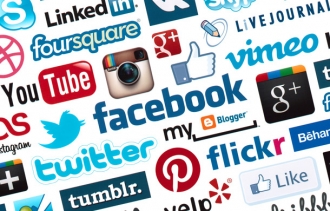 If your marketing strategy doesn’t have a serious social media component you should probably consider adding one. While most people in the U.S. still use traditional search engines such as Google to find what they’re looking for online, users — especially younger ones — are increasingly discovering websites by way of social networks.
If your marketing strategy doesn’t have a serious social media component you should probably consider adding one. While most people in the U.S. still use traditional search engines such as Google to find what they’re looking for online, users — especially younger ones — are increasingly discovering websites by way of social networks.
Last year, half of all internet users ages 18 to 23, and 43 percent of users ages 24 to 32, used social networks as their go-to internet-discovery resource, according to a new report from Cambridge, Mass.-based Forrester Research. Overall, social networks like Facebook and Twitter are the preferred means of discovery for nearly a third of all Americans, up from 18 percent in 2010.
At the same time, 54 percent of American internet users still relied on traditional search results to find the information they were looking for. As expected, that number is on the decline and, according to the report, represents a seven-point drop in overall search engine popularity from 61 percent in 2010.
Although consumers are rapidly changing their habits and behavior, marketers still haven’t caught up, prioritizing SEO and paid search efforts above engagement over social media. In order to turn that around, the report asserts, search marketing teams need to learn what searchers are really looking for and focus on broader engagement instead of simply trying to drive an immediate sale.
Some other interesting highlights from the report:
•Direct marketing works. In 2012, 26 percent of users reported typically finding websites through corporate and branded emails, an 11 point jump from the previous year.
•Sponsored search results surge in popularity. Last year, 18 percent of web users said paid search results helped them find what they were looking for. That’s up from eight percent just the year before.
•Links keep users engaged. Roughly 28 percent of all internet users, regardless of age, discover new sites from links on websites they’re already visiting, the report said.
Posted in Online Marketing
Tagged facebook, marketing, online marketing, seo, social media, twitter, youtube
Why Social Media Is Far More Important Than You Think
The growth of social media as an influencing factor in our lives is truly breathtaking.
91% of American adults who are online use social media. Nearly a quarter of the total time spent online is on social networks. There are now over 800 million Facebook users in the world, with more than 200 million joining in 2011 alone. Nearly 40% of those 800 million log in every single day. It is not just Facebook that’s growing either – Twitter is adding half a million users on a daily basis, and there is a new kid on the block that has managed to attract over 90 million users in just over half a year.
Why Is This Relevant To Me?
It is relevant to you because you own a brand. It doesn’t matter if you are a part-time blogger, a small business, or a huge corporation – you have a brand. And if you have any interest in furthering your brand, you cannot ignore social media. And social media doesn’t want to ignore you. Over half of social networkers follow a brand. Moreover, 56% of consumers say that they are more likely to recommend a brand as a fan. That’s right – half of your customers are just waiting for you to reach out to them, and they are primed to promote your brand for you. You may be shrugging your shoulders at this point. You probably already use social media. But I’m willing to bet that you don’t value the power of social media as much as you should.
The True Value Of Social Media Users
When it comes to the internet, a social media consumer is the best type of consumer. There is ample evidence to effectively argue that social media users are far more active and influential than the average internet user.
Gigya recently published data gleaned from their onsite social media login platform. Analysis of the data provides some pretty fascinating insights. They found that on websites with social login functionality, logged-in users spend 50% more time on site, and view twice as many pages, than those who do not log in. The data strongly suggests that statistically speaking, people always want to be social, regardless of where they are on the web.
But that’s not all – social media types will give you more money too. Take these statistics, for instance, relating to social media users:
• 75% are more likely to be heavy spenders on music
• 47% are more likely to be heavy spenders on clothing, shoes and accessories
• 26% are more likely to give their opinion on politics and current events
• 44% are more likely to give an opinion on television programs
Social media users spend the most, and are more influential on their peers, than the average internet user. They are exactly the kind of people you want to attract to your brand.
Here’s the kicker – even if you already pour an enormous amount of time and resources into social media, you probably aren’t doing it in the most effective way possible (best case scenario), or you are getting it completely wrong (worst case scenario).
So let’s explore what you should be doing to make the best use of social media in marketing your brand.
It’s Not All About Facebook
Facebook is undoubtedly the king in terms of market share, but they should not necessarily be the primary social media network that you target. Consider this – 40% of people who login via Gigya’s platform use social media logins other than Facebook. Nearly half of social media users prefer alternative platforms.
When formulating a social media strategy, you should consider the makeup and target demographics of your brand. Depending on who you are targeting, Facebook may make up less than half of your target audience. Consider these facts:
• Twitter has the wealthiest users
• Facebook has the oldest users
• Digg has the best educated users
• StumbleUpon is a haven for graphic designers
When it comes to dividing your focus amongst social media networks, you would do well to consider how your resources are best allocated. The StumbleUpon fact is there as more of a wildcard than an actionable piece of data – it demonstrates that there is much more to social media success than throwing all of your eggs in the Facebook basket.
The Importance Of Interaction And Incentive
As with many things in life, social media will only give you as much as you put in. The key to social media success boils down to two factors – interaction and incentive.
Interaction
The same Gigya study mentioned above showed that people spend the most time on websites when they are commenting. Or to put it more generally, visitors spend the most time on websites where they can voice and share their opinions. If you can engage with visitors to your site, they will hang around for longer. And the longer they hang around, the better exposed they are to your brand.
You can get ahead of the game when it comes to social media interactivity by following two simple steps:
1. Do not automate
2. Communicate
Auto-posting to Facebook decreases likes and comments by 70%. If you are going to autopost, you may as well not waste your time in setting it up and do something else instead. And nearly four out of every five consumers interact with brands on Facebook primarily through reading posts and updates from the brands.
Even though interaction is so plainly important, 95% of Facebook wall posts are not answered by brands. That’s a whole load of brands missing out on a whole load of potential.
Incentive
Increasing your follows or likes is not rocket science. Effective growth is generated by a strategy based upon a very simple principle – people will rarely do something for nothing. Generally speaking, people will follow you because they get something in return. The majority of people choose to follow a brand for one of two reasons:
1. They are already a customer
2. They want to receive discounts and promotions
The first group will take care of themselves – as long as you effectively promote your social media presence, they will come across you, follow you, and begin to spread the word. It is the second group that you need to focus on primarily. In order to gain their attention, you must incentivize. Don’t just slap up a Facebook page and expect the likes to roll in – give them a reason.
Takeaways
There is a lot of information to digest in this article, and a lot of strategizing to follow, no doubt. However, there are three clear and simple facts to take away:
1. Social media is vital to the growth of your brand
2. There are right ways and wrong ways of using social media
3. You should do it the right way
Social media does not have to be wildly overcomplicated. Just concentrate on offering value, incentivizing, and interacting.
The rest will follow.
Posted in Online Marketing
Tagged advertising, facebook, marketing, online marketing, social media, twitter

Most Brands Are Not Prepared to Manage Negative Social Comments
Over half of brands (55.5%) do not not have an effective strategy in place to deal with negative comments on social networks, according to a recent report from Social Media Marketing University (SMMU).
Some 24.5% of brands are in the process of developing a strategy for dealing with negative comments, 7.6% have strategies in place that are proving to be ineffective, and 23.4% do not have a strategy in place and do not have plans to develop one, the study found.
The report was based on data from a survey of 1,036 marketers, social media strategists, C-Level executives, and entrepreneurs.
Other key findings:
26.1% of respondents say their brand’s reputation has been tarnished as a result of negative social media posts, 15.2% have lost customers, and 11.4% have lost revenue.
58.2% of brands receive customer complaints via social media occasionally, 10.9% receive them somewhat often, and 4.9% receive them very often.
Only 17.6% of brands strive to respond to customer complaints on social media within an hour. Most (52.2%) respond within 24 hours, and 21.4% percent rarely or never respond.
About the research: The report was based on data from a survey of 1,036 marketers, social media strategists, C-Level executives, and entrepreneurs conducted February 10-13, 2014.
Source: https://www.marketingprofs.com/charts/2014/24698/most-brands-are-not-prepared-to-manage-negative-social-comments